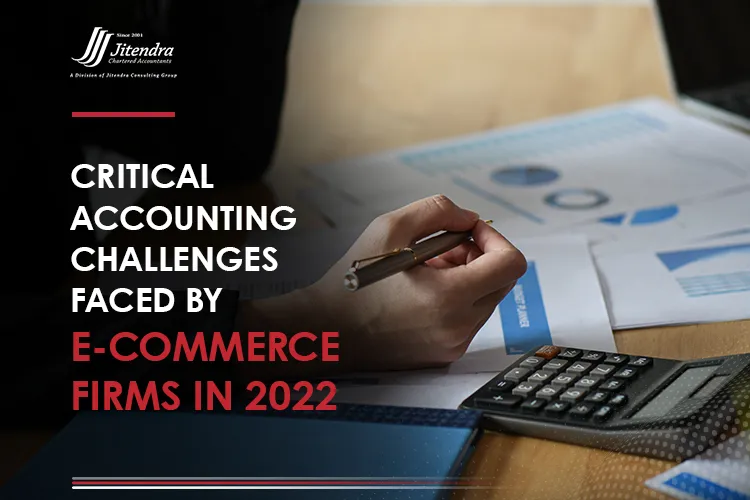
Critical Accounting Challenges Faced by E-Commerce Firms in 2022
When it comes to financial management and accounting, every industry has its pros and cons. However, the e-commerce industry faces some unique challenges and most online sellers are not equipped to deal with them. Working closely with the best accounting firms in Dubai can help e-commerce businesses to simplify such challenges. Read the below blog to learn about the critical accounting challenges you must be aware of while running an e-commerce business:
Inventory Management can be Complex
When it comes to e-commerce accounting, inventory management can be challenging for business owners no matter how small the business is. Things will become more complicated with new products and sales channels. You have to track the items you have and how much they are worth. You may also need to track where the items are located if you have multiple warehouses or fulfilment centres. Each sale will change the total inventory quantity and the arrival of returned products at the warehouse in good condition will also impact the inventory.
Inventory management is the spine of every e-tailer’s cash flow, which makes it critical for you to have full control over it. Using automated inventory management systems will provide you with accurate data so your financials will always be up-to-date. Accounting firms in Dubai can equip you with all you need to know about inventory management.
You May Struggle to Track Seller Fees
Most online sellers operate through e-commerce platforms such as Noon or Amazon. Many of these platforms will charge you a flat monthly fee to sell on their platform. It will be harder for you to track other miscellaneous fees. For example, Amazon’s fee structure is composed of fees for listing, transactions, advertising, and for fulfilling each order.
The flat fee percentage is dependent upon the category of the product, its size and weight for shipping. These expenses will be recorded together as ‘Amazone Fees’ at the end of the month. This method will give zero granularity to the sellers, making their budget planning tougher. Automation can be more sustainable as it will reduce your work when you scale. Accounting companies in Dubai can help you take the guesswork out of tracking merchant costs.
Transaction Volume Can Blow Up the Accounting System
Lots of small transactions with lots of data are one pestering challenge associated with the retail industry. The traditional retail selling business can navigate it easily with a good point of sale system that can automatically categorize SKU-level sales data. Your accounting system may not be good at handling a great volume of detailed transactions each month. Inefficient accounting systems will slow down as they cannot handle that level of data. Online sellers, in such a case, have to find out an intelligent method to batch their transactions.
The Trouble with the Returned Goods
E-commerce accounting becomes more arduous while dealing with returned goods. Most sellers allow their customers to return items that arrive damaged, don’t fit or don’t work properly. Sometimes, customers may return an item in good condition without any valid justification. However, e-commerce sellers can’t compromise on their “Return Policy” as a favourable return policy boosts brand loyalty.
Accepting the returned goods is in your company’s best interests but it can throw a wrench into your accounting process. You need to issue a refund to the customers and re-add the returned product to the inventory. You need to navigate this by updating your accounting software to accommodate returns.
Tax Liability can be Confusing
The UAE imposes Value Added Tax (VAT) at a meagre rate of 5%. However, unlike the traditional retail industry, VAT can be confusing to online sellers. Goods and services purchased through e-commerce sites are subject to the standard VAT rate of 5%. However, the place of supply should be the UAE. Confusion may arise regarding the place of supply, implications under the reverse charge mechanism, VAT registration for the non-resident supplier, official and commercial evidence for export, and implications for import of goods through agents etc. Accounting companies in Dubai can help you navigate your VAT requirements.
Seek the Support of the Best Accounting Firms in Dubai, UAE
E-commerce players need to identify the challenges early and deal with them properly to ensure business success in the UAE. You can navigate the challenges of e-commerce accounting with the help of the best accounting firms in Dubai such as Jitendra Chartered Accountants (JCA). We offer complete accounting & bookkeeping services in Dubai that will help you meet your e-commerce business requirements.
JCA is a leading accounting company in the UAE with more than 20 years of experience. We have served clients from all industries including retail, manufacturing, and e-commerce. Apart from providing accounting services in the UAE, we also help you deal with audits, VAT return filing, Economic Substance Regulations (ESR), Ultimate Beneficial Ownership (UBO), Anti-Money Laundering (AML) etc. Consult with us today to get the right accounting advice.


